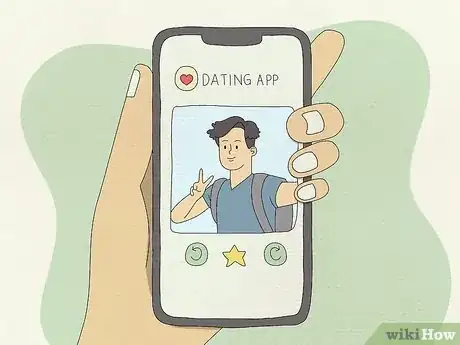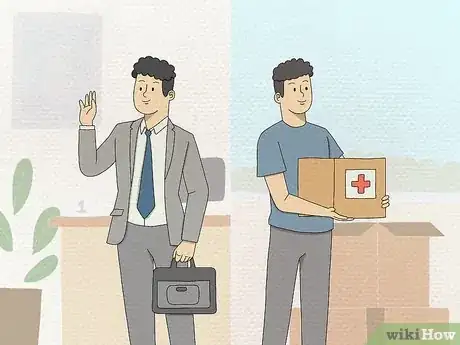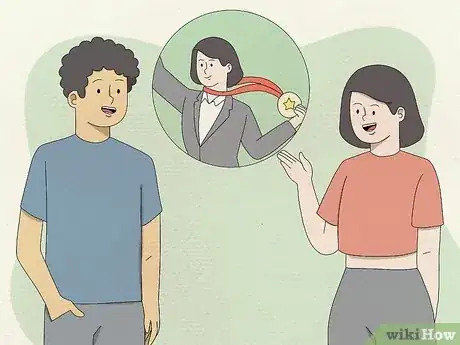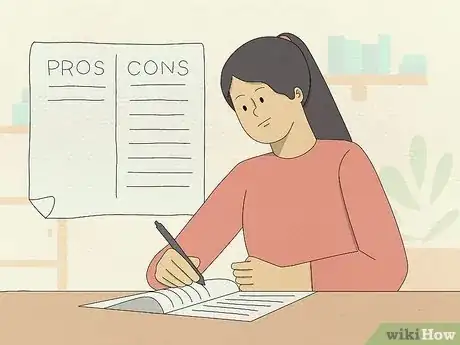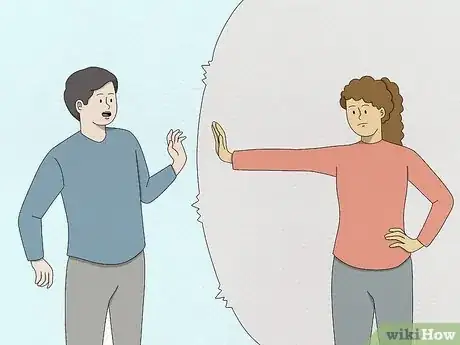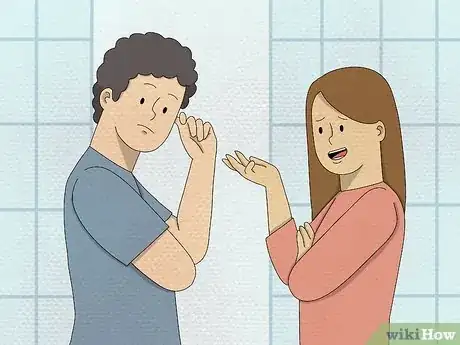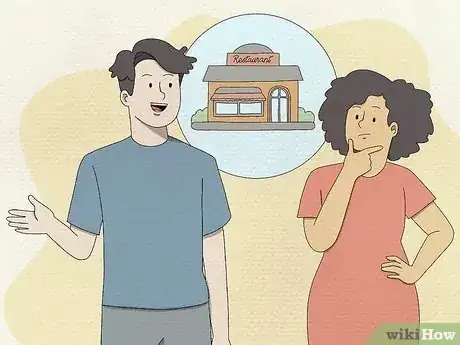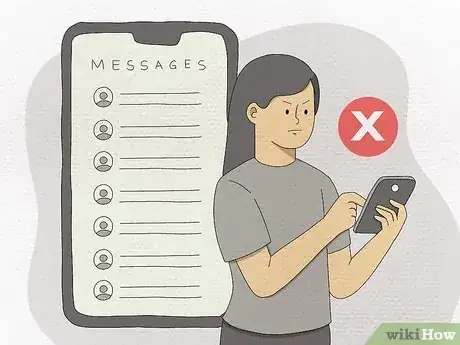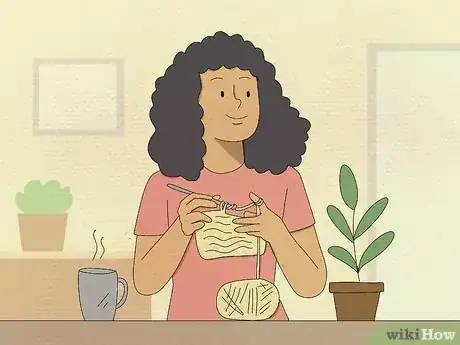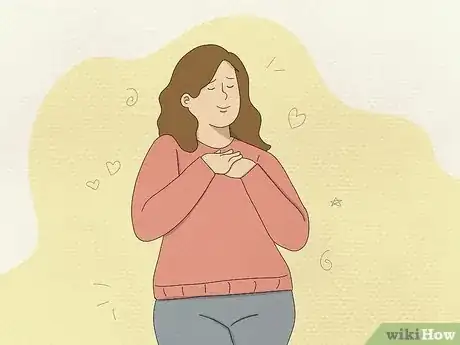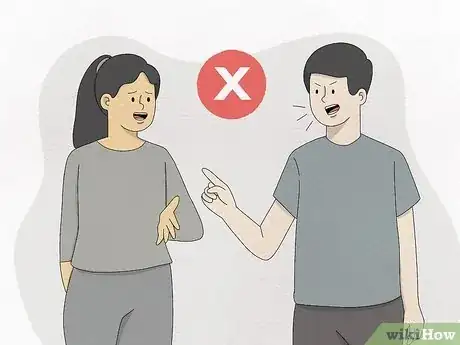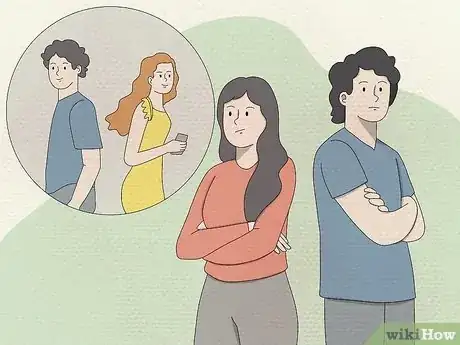This article was co-authored by Klare Heston, LCSW. Klare Heston is a Licensed Independent Clinical Social Worker based in Cleveland, Ohio. With experience in academic counseling and clinical supervision, Klare received her Master of Social Work from the Virginia Commonwealth University in 1983. She also holds a 2-Year Post-Graduate Certificate from the Gestalt Institute of Cleveland, as well as certification in Family Therapy, Supervision, Mediation, and Trauma Recovery and Treatment (EMDR).
This article has been viewed 35,423 times.
Though finding a partner or best friend who loves you can be one of life's greatest joys, finding the person who will give that love to you without conditions is all the more sacred and special. Though it may seem that this person is hard to find, you will sometimes learn that love is just around the corner, especially if you seek it actively and constructively. You can find your unconditional love if you look for good partners, develop a happy relationship, and work on building deep love with that person.
Steps
Finding a Good Match
-
1Look in the right places. Before anything else, you will want to make sure that you are seeking love in the right places. Look for a significant other or a best friend in new places or in places that tend to attract the kind of people who you are looking to meet or whose interests align with your own. For instance, if you're hoping to meet someone who enjoys the outdoors, join a hiking club.
- If you have had bad luck with meeting others in bars or clubs, stay away from making connections in those places in particular.
- You can also consider online dating. Avoid sites that have stigmas for being hookup apps, like Tinder. Try something that is taken a bit more seriously.
-
2Seek out mature partners and friends. Once you begin this process, look for those who are cooperative, stable, honest, kind and secure. You will find that having a relationship with someone with those qualities will be much easier and more blissful. Stay away from those who are hotheaded, mean, or self-centered.[1]Advertisement
-
3Don't sell yourself short. Sometimes, when you are in a relationship or building a friendship, you might have a tendency to be overly modest or to downplay yourself. However, in doing so, you decrease your own value. Though you should stray away from bragging, you should still be sure to be honest about your positive traits and accomplishments, particularly if asked.[2]
- Never dumb yourself down or pretend not to know something.
- Share your recent accomplishments with your loved ones and celebrate when they achieve milestones, as well.
-
4Have clear goals. As you are entering into a phase of newness with a friend or partner, you should always know your goals before beginning even the most initial levels of the relationship. If you are looking for marriage, you should accept that and make it known fairly early. If you are interested in a serious relationship, you should also make that known. Be honest with yourself and be honest with others.[3]
- You don't need to tell someone on the first date that you want to get married; but they should know that you are not dating for fun or to be casual.
- You might say something like, “I've done the whole dating thing for a while and it's fun but I'm looking for something more now. I'm dating to marry.” They will respect your honesty and you can avoid wasting time on those who are not looking to be serious.
- If you are looking for a very close friend, communicate that, as well. This will help you avoid any confusion about your intentions.
-
5Balance feelings and logic. Perhaps you have met someone who you are developing strong feelings for. That's great! However, do not forsake your better judgement based on your feelings alone. When you have made a truly good match, both your heart and your head will often align. You will not have to second guess it, change yourself, or compromise your core values. If you find yourself having to do that, then perhaps you should continue your search for love.[4]
- Consider writing a pros and cons list and weighing both. In a relationship, the pros should always outweigh the cons.
- If the list goes very clearly one way, try not to second guess over overthink it. For instance, if there are two or three items on the pro side and 15 on the con side, don't question whether or not you are being fair or if you should give the person a chance — move on.
-
6Seek out those with mutual interest. A person who is truly into you will not make you second guess that nor will they play games or play hard to get. If someone is not calling or texting you back, then chalk it up as a loss and move forward with your life. Only make an investment in someone who is working to also make an investment in you.[5]
Developing a Healthy Relationship
-
1Set boundaries. In any relationship, you should set clear boundaries with your partner. Perhaps you find it okay to crack jokes on one another but not okay to name call. Or perhaps you don't mind if your partner goes out on the town without you as long as they don't accept drinks or dances from others. Whatever your limits are, you should communicate them to your partner openly and honestly.[6]
- Recognize that boundaries are typically not something you can compromise on, as these are typically your limits.
- If your partner cannot respect your boundaries, and your boundaries are reasonable, consider ending the relationship.
- In a friendship, your friend might expect that you keep anything they tell you between the two of you.
-
2Have a life outside of the relationship. One of the biggest mistakes people make is investing too much of their life into their relationship. In order for true love to grow, you should always maintain some healthy distance and a healthy life outside of your partnership. Your partner will love and appreciate you more if they do not feel that they are the sole source of your happiness.[7]
- Continue to maintain strong friendships and devote yourself to your work.
- Explore some hobbies apart from your partner.
-
3Communicate effectively. In order to build a healthy relationship and develop unconditional love with your partner, you should ensure that you do your part in effective communication. When discussing any issues in your relationship, use “i” statements, rather than “you” statements, which can come off as accusatory. Don't use your phone when they are talking or indulge in other distractions; give them your full attention.[8]
- Be honest with one another and avoid lying.
- Try to discuss issues as they happen and avoid going to bed upset. Do give one another some time to cool down, however.
- Don't interrupt or talk over your partner. Allow them space to speak.
- Listen to hear, not to respond.
-
4Compromise when necessary. Often in a relationship, compromise will be necessary. Recognize that any relationship is a process of social exchange, of constant give and take. Though you will be doing a lot of giving, you should still feel that you are happy and equal in the relationship and having your needs met. Talk about your issues and make negotiations and concessions where you can, still holding fast to your core values.[9]
- For instance, perhaps you always go to a certain restaurant on Saturdays but your partner wants to try something new. A compromise would be for you to take turns picking the restaurant you go to on Saturdays or to go out separately or with friends.
-
5Show love and kindness. In order to receive unconditional love, you should also show this same level of love and kindness to your partner. Show love to them daily and do random acts of love and kindness for them often. You will find that deep and resounding love is a dual effort and that often, the more you put in, the more you will get out.[10]
- Help them with a project they are working on or bring them lunch randomly one day.
-
6Build trust. True love should be built on trust. If you do not have trust in your relationship, you cannot hope to have a dynamic that is healthy and secure. Trust and believe in your partner unless they give you a reason not to. Don't snoop in their belongings or go on their phone without permission.[11]
- If you have a question for your partner about something, ask them openly and directly.
- Remember that love and trust go hand in hand.
Building Unconditional Love
-
1Love yourself first. Unconditional love from another person will be hard to come by if you don't love yourself first. Work on developing self love for yourself and you will find that unconditional love will flow naturally from that.[12]
- Practice self care. Spend time on your hobbies. Take time out of your schedule every day for yourself.
- If you struggle to prioritize your needs, consider finding a counselor to help you build your own unconditional love for yourself.
-
2Be yourself. In order to truly receive the love that you want, you must make sure to be your authentic self with your partner. Don't mute or limit yourself in anyway; express your emotions and your thoughts in ways that are constructive and healthy. Continue to spend time with family and friends and do all the other things that you enjoy.[13]
-
3Don't try to change your partner. Unconditional love thrives when the two partners in the relationship feel that they can be completely and totally themselves. Do not try to change your partner in any drastic way.[14] Accept them as they are.
- Allow your partner to be themselves. Tell them how their behavior makes you feel, but don't try to control them. If they are listening to you, they will likely make the change themselves.
-
4Accept the love you are offered. Sometimes, you might feel the tendency to shut down emotionally when your partner tries to show you love and affection. You may feel that the relationship is moving too fast or that you are fearful of the future. However, in order to receive a deeper level of love from your partner, you must not shun them. Accept and return their love and affection.[15]
- Don't turn away their affection or acts of kindness. Instead, focus on showing them how much you appreciate them.
-
5Recognize that love is not always enough. At the end of the day, though love is truly wonderful, remember that you need more than that to have a successful relationship with someone. Even if the love that you feel for them and that they feel for you are unconditional, know that a relationship does in fact have core conditions. For instance, you should always expect fidelity and respect in your union. If those are absent, then love is not enough.[16]
Expert Q&A
-
QuestionWhat does it mean when someone loves you unconditionally?
 Klare Heston, LCSWKlare Heston is a Licensed Independent Clinical Social Worker based in Cleveland, Ohio. With experience in academic counseling and clinical supervision, Klare received her Master of Social Work from the Virginia Commonwealth University in 1983. She also holds a 2-Year Post-Graduate Certificate from the Gestalt Institute of Cleveland, as well as certification in Family Therapy, Supervision, Mediation, and Trauma Recovery and Treatment (EMDR).
Klare Heston, LCSWKlare Heston is a Licensed Independent Clinical Social Worker based in Cleveland, Ohio. With experience in academic counseling and clinical supervision, Klare received her Master of Social Work from the Virginia Commonwealth University in 1983. She also holds a 2-Year Post-Graduate Certificate from the Gestalt Institute of Cleveland, as well as certification in Family Therapy, Supervision, Mediation, and Trauma Recovery and Treatment (EMDR).
Licensed Social Worker Being loved unconditionally means without any reservation or conditions. For example, "I love you when you get good grades," but "I also love you when you don't." Another example, is "I love you no matter which job you have or how much you weigh."
Being loved unconditionally means without any reservation or conditions. For example, "I love you when you get good grades," but "I also love you when you don't." Another example, is "I love you no matter which job you have or how much you weigh." -
QuestionHow can you love someone unconditionally?
 Klare Heston, LCSWKlare Heston is a Licensed Independent Clinical Social Worker based in Cleveland, Ohio. With experience in academic counseling and clinical supervision, Klare received her Master of Social Work from the Virginia Commonwealth University in 1983. She also holds a 2-Year Post-Graduate Certificate from the Gestalt Institute of Cleveland, as well as certification in Family Therapy, Supervision, Mediation, and Trauma Recovery and Treatment (EMDR).
Klare Heston, LCSWKlare Heston is a Licensed Independent Clinical Social Worker based in Cleveland, Ohio. With experience in academic counseling and clinical supervision, Klare received her Master of Social Work from the Virginia Commonwealth University in 1983. She also holds a 2-Year Post-Graduate Certificate from the Gestalt Institute of Cleveland, as well as certification in Family Therapy, Supervision, Mediation, and Trauma Recovery and Treatment (EMDR).
Licensed Social Worker You might not like someone's habits, but that does not take away from the love you feel. Love is not an 'on and off again' feeling or commitment. It is pervasive. It is immature or disingenuous to turn love on and off like a faucet.
You might not like someone's habits, but that does not take away from the love you feel. Love is not an 'on and off again' feeling or commitment. It is pervasive. It is immature or disingenuous to turn love on and off like a faucet. -
QuestionWhat is the difference between love and unconditional love?
 Klare Heston, LCSWKlare Heston is a Licensed Independent Clinical Social Worker based in Cleveland, Ohio. With experience in academic counseling and clinical supervision, Klare received her Master of Social Work from the Virginia Commonwealth University in 1983. She also holds a 2-Year Post-Graduate Certificate from the Gestalt Institute of Cleveland, as well as certification in Family Therapy, Supervision, Mediation, and Trauma Recovery and Treatment (EMDR).
Klare Heston, LCSWKlare Heston is a Licensed Independent Clinical Social Worker based in Cleveland, Ohio. With experience in academic counseling and clinical supervision, Klare received her Master of Social Work from the Virginia Commonwealth University in 1983. She also holds a 2-Year Post-Graduate Certificate from the Gestalt Institute of Cleveland, as well as certification in Family Therapy, Supervision, Mediation, and Trauma Recovery and Treatment (EMDR).
Licensed Social Worker The difference is that there are no restrictions or limitations on unconditional love. There is security of feeling; there is acceptance. Conditional love is dependent on you fulfilling certain expectations to get to experience the love.
The difference is that there are no restrictions or limitations on unconditional love. There is security of feeling; there is acceptance. Conditional love is dependent on you fulfilling certain expectations to get to experience the love.
References
- ↑ https://psychcentral.com/lib/soulmates-and-unconditional-love/
- ↑ https://www.psychologytoday.com/blog/the-attraction-doctor/201303/how-can-i-find-good-man-or-woman
- ↑ https://www.psychologytoday.com/blog/the-attraction-doctor/201303/how-can-i-find-good-man-or-woman
- ↑ https://www.psychologytoday.com/blog/the-attraction-doctor/201303/how-can-i-find-good-man-or-woman
- ↑ https://www.psychologytoday.com/blog/the-attraction-doctor/201303/how-can-i-find-good-man-or-woman
- ↑ http://liveboldandbloom.com/11/relationships/unconditional-love-the-key-to-lasting-relationships
- ↑ http://liveboldandbloom.com/11/relationships/unconditional-love-the-key-to-lasting-relationships
- ↑ http://liveboldandbloom.com/11/relationships/unconditional-love-the-key-to-lasting-relationships
- ↑ http://liveboldandbloom.com/11/relationships/unconditional-love-the-key-to-lasting-relationships
- ↑ http://liveboldandbloom.com/11/relationships/unconditional-love-the-key-to-lasting-relationships
- ↑ http://liveboldandbloom.com/11/relationships/unconditional-love-the-key-to-lasting-relationships
- ↑ http://liveboldandbloom.com/11/relationships/unconditional-love-the-key-to-lasting-relationships
- ↑ http://tinybuddha.com/blog/the-foundation-of-love-releasing-judgments-and-expectations/
- ↑ http://liveboldandbloom.com/11/relationships/unconditional-love-the-key-to-lasting-relationships
- ↑ https://psychcentral.com/lib/soulmates-and-unconditional-love/
- ↑ https://psychcentral.com/lib/soulmates-and-unconditional-love/
